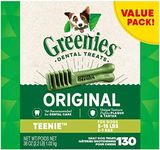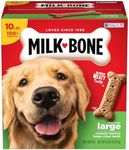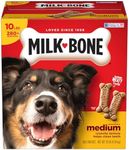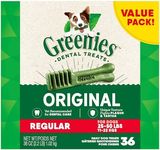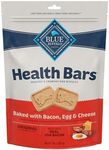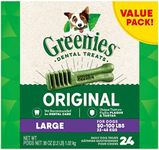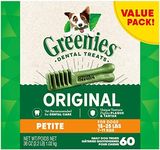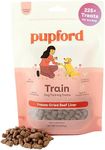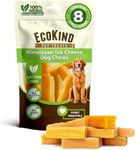Buying Guide for the Best Healthy Dog Treats
Choosing the right healthy dog treats for your furry friend is essential for their overall well-being and happiness. Healthy treats can be a great way to reward your dog, provide them with necessary nutrients, and even help with training. When selecting dog treats, it's important to consider several key factors to ensure you're making the best choice for your pet's health and dietary needs.IngredientsIngredients are the most important aspect of any dog treat. They determine the nutritional value and safety of the treat. Look for treats with natural, high-quality ingredients such as real meat, vegetables, and whole grains. Avoid treats with artificial preservatives, colors, and flavors, as well as those with excessive fillers like corn, soy, and wheat. If your dog has allergies or sensitivities, make sure to choose treats that are free from those specific allergens.
Nutritional ContentThe nutritional content of dog treats is crucial for maintaining your dog's health. Check the protein, fat, and fiber content to ensure the treats align with your dog's dietary needs. High-protein treats are great for active dogs, while lower-fat options are better for dogs that need to manage their weight. Fiber can aid in digestion, so treats with a good amount of fiber can be beneficial for dogs with digestive issues.
Calorie CountCalorie count is important to prevent overfeeding and weight gain. Treats should make up no more than 10% of your dog's daily caloric intake. For small dogs or those on a weight management plan, opt for low-calorie treats. Larger or more active dogs can handle treats with a higher calorie count, but it's still important to monitor their overall intake to maintain a healthy weight.
Size and TextureThe size and texture of the treats should be appropriate for your dog's size and chewing habits. Small dogs or puppies may need smaller, softer treats that are easy to chew, while larger dogs might prefer bigger, crunchier treats. The right size and texture can also help with dental health, as some treats are designed to clean teeth and reduce plaque buildup.
PurposeConsider the purpose of the treats. Are they for training, dental health, or just an occasional reward? Training treats should be small and low-calorie so you can give them frequently without overfeeding. Dental treats are typically harder and designed to help clean teeth and freshen breath. General reward treats can be more varied but should still be healthy and nutritious.
Brand ReputationThe reputation of the brand can give you an idea of the quality and safety of the treats. Look for brands that are known for their high standards, transparency, and positive reviews from other pet owners. Research if the brand has had any recalls or issues in the past. Trustworthy brands are more likely to use high-quality ingredients and follow strict manufacturing processes.
